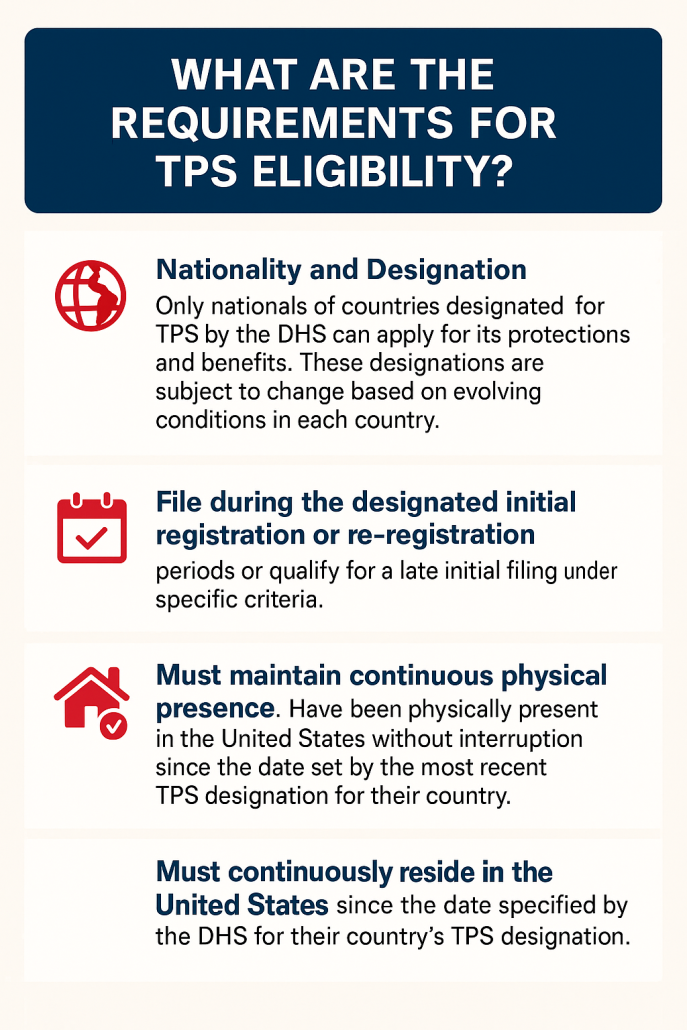Temporary Protective Status (TPS): Eligibility and Application Process
Some individuals may be unable to return to their home country due to serious threats to their safety. Temporary Protected Status (TPS) is a humanitarian program that offers protection to eligible foreign nationals from designated countries where conditions temporarily prevent safe return. These conditions may include armed conflict, environmental disasters, epidemics, or other extraordinary but temporary circumstances.
Eligible individuals may receive temporary protection from deportation and apply for an Employment Authorization Document (EAD), which permits legal employment in the United States during the designated TPS period.
An experienced immigration attorney at Bassey Immigration Law Center, P.A. can guide applicants through each step to ensure compliance and improve the likelihood of approval.
Temporary Protective Status
The Secretary of the Department of Homeland Security (DHS) administers the Temporary Protected Status program and determines which countries qualify based on conditions that temporarily prevent safe return, such as armed conflict or environmental disasters.
Individuals granted TPS cannot be removed from the United States during the designated period, may apply for travel authorization, and, as noted, are eligible to apply for an Employment Authorization Document (EAD) to work legally in the U.S.
What Are the Requirements for TPS Eligibility?

Only nationals of countries designated for TPS by the DHS can apply for its protections and benefits. These designations are subject to change based on evolving conditions in each country.
In addition to nationality and designation, TPS applicants must meet the following requirements:
- File during the designated initial registration or re-registration periods or qualify for a late initial filing under specific criteria.
- Must maintain continuous physical presence. Have been physically present in the United States without interruption since the date set by the most recent TPS designation for their country.
- Must continuously reside in the United States since the date specified by the DHS for their country’s TPS designation.
Who is Ineligible?
Not all individuals from TPS-designated countries will qualify. TPS may be denied or withdrawn if an applicant:
- Has been convicted of any felony or two or more misdemeanors committed in the United States.
- Is subject to mandatory bars to asylum, including individuals who have participated in the persecution of others, committed certain serious crimes, or engaged in or supported terrorist activities.
- Fails to meet the continuous physical presence or continuous residence requirements as specified for their designated country.
- Does not file within the initial registration or re-registration periods, unless they qualify for a late initial filing under specific exceptions.
TPS Application Process
To begin the TPS application process, file Form 1-821, Application for Temporary Protected Status, with U.S. Citizenship and Immigration Services (USCIS). Along with the form, you must submit initial evidence to support your eligibility, which includes:
- Proof of identity and nationality, such as a passport or national identity document.
- Proof of date of entry into the United States, typically through an I-94 arrival/departure record, visa, or other travel documentation.
- Evidence of continuous residence in the United States includes utility bills, lease agreements, pay stubs, or other dated records.
- Certified copies of court disposition records, if applicable, for any arrests or criminal charges.
Next Steps
Once your Form I-821 and supporting documents are submitted, U.S. Citizenship and Immigration Services (USCIS) will review the application for completeness. If the basic filing criteria are met, USCIS will issue a receipt notice confirming the application has been accepted for processing.
If biometrics (fingerprints and photographs) are required, USCIS will schedule an appointment at a local Application Support Center (ASC).
Applicants must bring the following to their ASC appointment:
- Proof of identity and nationality, such as a passport
- ASC appointment notice
- USCIS receipt notice
- Employment Authorization Document (EAD), if one has previously been issued
Request for Evidence
USCIS may also issue a Request for Evidence (RFE) if additional documentation is needed. Applicants must respond promptly to avoid delays or denial.
If the application is approved, USCIS will send a written approval notice and, if requested, issue an Employment Authorization Document (EAD). If the application is denied, USCIS will notify the applicant in writing, explaining the reason for the denial and outlining options for appeal, if available.
Contact a Citizenship Lawyer at Bassey Immigration Law Center, P.C.
If you have questions about TPS and your eligibility, an experienced citizenship lawyer at Bassey Immigration Law Center, P.C., can help. Schedule an affordable consultation today. We will assist you with your application and ensure all forms are completed properly and on time with appropriate signatures and fees. If your TPS application is denied, we can help you file an appeal.
About Bassey Immigration Law Center, P.A.
Bassey Immigration Law Center, P.A., led by attorney Aniefiok Bassey, provides comprehensive immigration services to individuals, families, and businesses in Florida and beyond. With over 20 years of experience, the firm assists clients with a wide range of immigration matters, from family reunification and green cards to business visas and deportation defense. The diverse, multilingual team is dedicated to supporting clients through the complex immigration process, with a special focus on citizenship, asylum, and LGBTQ+ immigration needs. They offer affordable initial consultations and are committed to delivering personalized, strategic guidance for achieving clients’ immigration goals.



